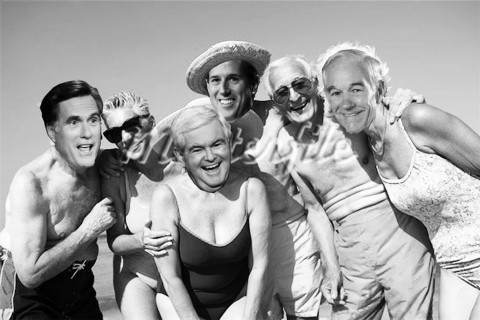About a month into the primaries—covering Iowa, New Hampshire, South Carolina and Florida—the race has increasingly become a competition between Newt Gingrich and Mitt Romney. However, all four remaining nominees have made it clear that they are in it for the long run. In the most recent Florida primary, Romney pummeled Gingrich with a near 15% lead. According to the New York Times, there was a 98% republican voter turnout; Romney took 46% of the vote, while Gingrich followed with around 32%. Rick Santorum and Ron Paul combined for approximately 21%, as Paul came in fourth place with only 7% of the vote. For many political analysts, the Florida primary is the best indicator of who is most capable of beating Obama, in terms of Florida’s similarities in political and ethnic diversity in comparison to the rest of the United States.
Romney has certainly made it one of his main strategies to point out that he is the only candidate capable of beating Obama on November 6. Despite his arguable value—his presidential looks, successful business career, experience as Massachusetts governor, debating skills and highly expensive campaign (valued around $57 million)—is it really likely that we will see him in the White House?
It is also possible that Gingrich will surge past Romney in Nevada, Colorado and Missouri. However, Santorum’s negative advertising against Gingrich may actually be helping Romney’s campaign if Santorum drops out of the race.
On the Democratic side, President Obama has already raised nearly $140 million for his campaign. Obama has the likeability factor in his favor: he has a golden smile, a first lady who breaks bread with TV icons like Ellen DeGeneres and Oprah and the majority of the mainstream media on his ticket. But what goes against Obama? Issues like the high unemployment rate (fluttering around a reported 9%), the failing economy, immigration, America’s debt and credit downgrade, foreign policy decisions like that of America’s participation in Libya and health care reform will surely be issues for which the Republican candidate will look to attack Obama. Each candidate has mainly focused on the topics of job creation, the importance of a free market economy, cutting spending, lowering taxes or enforcing a flat tax rate, repealing Obamacare and the importance of morality in American society—all typical positions of the Republican party. With all of the candidates preaching very similar views, what differentiates them?
Frontrunner Romney has served as Massachusetts’ 70th governor, an impressive feat in a primarily blue state. But he also stressed his success in the private sector, distinguishing himself as a candidate with vast personal knowledge of how the economy works. His competitors have critiqued him as a “flip-flopper” on issues like abortion and gay marriage. Republican voters also hesitate to back Romney because of the healthcare system he implemented in Massachusetts that features many similarities to Obamacare. Gingrich has no trouble making it clear that he feels Romney will not be able to defend himself in a debate with Obama on healthcare reform. Romney’s robotic, lackluster personality may also worry some voters.
Gingrich, former Speaker of the House, stands in stark contrast to Obama, a characteristic that he prides himself on and sees as a major bonus in his strategy to win the election. Liberals tend to be adamantly opposed to Gingrich because of his strong voice on social issues such as gay marriage and abortion. He is perhaps the most aggressive candidate in terms of attacking the liberal media. Despite his sullied marital record and seeming lack of morality, he still remains a viable Republican candidate because of his assertive, conservative ideals which, as clearly demonstrated in South Carolina, can work quite well for him.
Santorum is also strongly conservative across the board. He served as Senator of Pennsylvania from 1995 to 2007. His campaign slogan is “Elect the True Conservative.” Youth voters don’t take well to him, with his stance on gay marriage occasionally getting booed on college campuses. He gained support in the beginning of January by winning Iowa, but has continuously fallen behind in the past few caucuses.
Texas Congressman Ron Paul runs on fiscally conservative beliefs and is the clearest voice against big government in this primary. Republican voters see him as “right on the money” on economic issues. However, his lack of focus on social issues keeps him from gaining more ground in the Republican primary, and his unique position on foreign policy is something that works against him in the eyes of many conservative Republicans. His more socially-liberal views on war and drug policies in America keep him as a favorite for young voters. However unlikely it may be to see Paul as the Republican candidate, he won’t be dropping out anytime soon. This “constitutionalist,” anti-Fed, anti-big government politician has made it clear that he is in it for the long haul.
With about four more months to go in the primaries, it is a long road ahead. The vicious commercial attacks will surely get more aggressive. But candidates would be wise to focus more of their energy towards pointing out the flaws in our current president rather than ripping each other apart. After all, regardless of who wins the nomination, the ultimate goal of the Republican Party in this election is to get Obama out of office. We’ll see if any of these candidates are capable of that feat. •












98% turnout in FL primary? I don’t think so. That’s absurd. You might want to check your facts. Also, please reference who these political analysts are who say FL is a bellwether for the rest of the country. I can’t agree with all of this emphasis you’re placing on FL.
http://www.nytimes.com/2012/02/01/us/politics/romney-wins-big-in-florida-primary.html